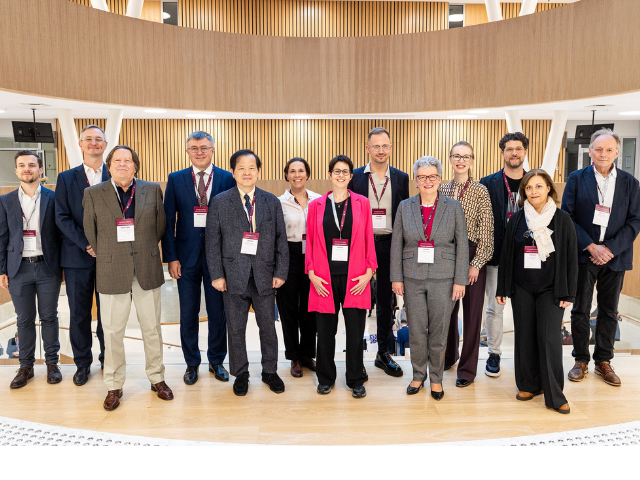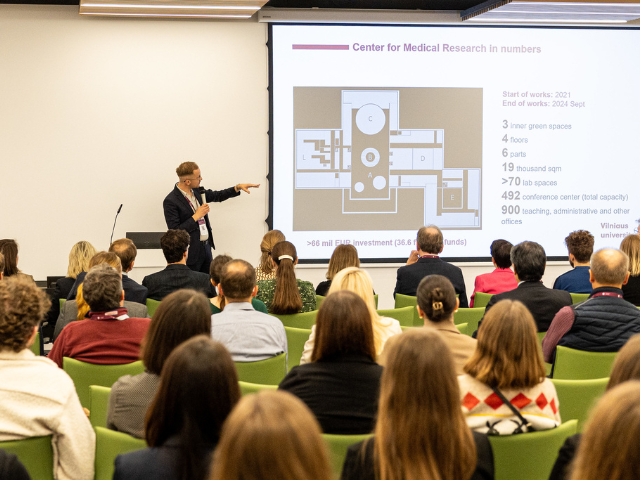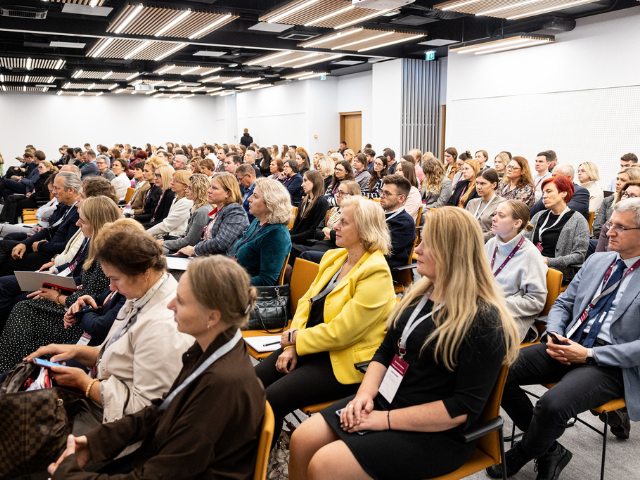On October 4 of this year, Vilnius University’s (VU) Faculty of Medicine (MF) and the Life Sciences Center (LSC) hosted the international conference Translational Research: Bridging Gaps, Improving Lives to celebrate the opening of the VU Faculty of Medicine's Medical Science Centre.
The event was opened by Assoc. Prof. Karolis Ažukaitis, the Vice-Dean for Science and Innovation at the VU MF, Prof. Edita Sužiedėlienė, the Vice-Rector of Vilnius University, Prof. Eugenijus Butkus, the Chairman of the Board of the Research Council of Lithuania, and Rasa Kulvietienė, the Advisor to the Ministry of Education, Science and Sport.
“It began as a vision that has become a reality. Now it’s time to pursue new visions: what we plan to do and achieve here,” said Assoc. Prof. Ažukaitis in his opening speech, when he welcomed everyone to the conference at the new Medical Science Centre, expressing his gratitude to the event's significant sponsors and partners: the Eureka Institute for Translational Medicine, the Future Biomedicine Foundation, the Young Academy at the Lithuanian Academy of Sciences, and the Association of Young Physicians.
“The Centre nurtures big ambitions: we plan to foster innovative research in medicine and health sciences and promote interdisciplinary partnerships that harness our strengths, research potential, and expertise in the life sciences, clinical medicine, the natural and technological sciences. We will also strive for closer cooperation with industry and other interested stakeholders,” Prof. Sužiedėlienė noted in her welcome speech. She also pointed out that it is vital for the new science centre to nurture the younger generation of researchers and specialists.

The event, dedicated to translational science, featured presentations from scholars, educationists, and representatives from the world's leading institutions in the field: Prof. Salvatore Albani (DUKE-NUS Medical School, Singapore), Prof. Berent Prakken (Utrecht University Medical Centre [UMC Utrecht], of the Netherlands), Prof. Lisa Guay-Woodford (University of Pennsylvania, USA), Dr. Marc van Mil (UMC Utrecht, the Netherlands), Prof. Femke van Wijk (UMC Utrecht, the Netherlands), Prof. Makoto Suematsu (Central Institute for Experimental Medicine and Life Science, Kawasaki, Japan), and Dr. Angela Gritti (San Raffaele Telethon Institute for Gene Therapy, Italy).
“Translational medicine is not a linear process. It is not a simple journey from the lab to the patient’s bed. Patients and their needs are always at the center of translational medicine. We are all interconnected, each contributing our own expertise and vision towards making a difference. Our motto is ‘patience and hard work.’ I think that inspires us all. Eureka was founded many years ago to offer a different approach – a revolution, moving from individual contributions to collaboration to create a wider impact. Impact, above all, for society, on patient needs and the application of technology,” Prof. Albani, President of the Eureka Institute for Translational Medicine, said in his keynote speech during the first part of the conference.
Prof. Prakken continued the theme of his Singaporean colleague, arguing that by keeping the patient at the center, science should aim to make an impact on people's lives, directly or indirectly. In his presentation From Eureka to Impact: Avoiding the Valley of Death in Translational Research he discussed the challenges of transporting translational science into clinical practice. “Unfortunately, according to The Lancet, 85% of our medical research is ‘wasted’,” Prof. Prakken explained. He gave the example of Alzheimer's Disease, one of the most common diseases in the world: almost 100% of the 413 clinical trials testing 244 compounds between 2002 and 2012 did not show any significant effects from treatments. The situation is similar for diabetes: insulin was invented almost 100 years ago, but patients are dying younger, even under the age of 5. “Why do we end up with so much wasted research, and what are the consequences? What are the real goals we should pursue? Although we produce a lot of scientific articles, articles do not cure people. We must focus on the patients,” Prof. Prakken concluded.
“The 20th century was full of scientific discoveries, but people still suffer from diabetes, mental health disorders, and many other diseases. We often fail to translate scientific discoveries into clinical practice. Why is this happening despite our best intentions?” posed Prof. Guay-Woodford when addressing similar issues in her presentation, Advancing Clinical and Translational Research: the CTSA Program in the US. The CTSA (Clinical and Translational Science Award) program in the US is dedicated to finding faster and more effective solutions to advance clinical and translational science and, more importantly, solutions that can be quickly put into practice. Taking the example of the CTSA program, the professor noted that for new discoveries and innovations to ensure better public health, clinical science must evolve. She also highlighted that the CTSA program, which brought institutions and various scientists together, was one of the most important catalysts in the US in effectively fighting the pandemic. This is the only way to more effectively implement biomedical discoveries into clinical practice, achieve more rapid development, testing, and implementation of new prevention strategies in medicine, and to foster change – breaking down the isolation between disciplines, reducing barriers, and encouraging creative and innovative approaches.

In his presentation Educating for a Translational Skillset and Mindset, Dr. van Mil spoke about the changes required in the education programs for young translational science professionals today. He presented the international summer course for young scientists on translational medicine provided by the Eureka Institute. “The skills and mindset we are trying to train are uncommon in our educational program. We must achieve much better results than those currently provided in our standard programs. A translational scientist is not just an expert in the field and a consistent researcher. We also need people who can engage systemic thinking, to see connections that others do not see, and to create physical and operational connections within the system,” Dr. van Mil explained. The award-winning educationist from the Netherlands also stressed that a translational scientist needs to know their field and communicate, understand innovative processes, work in a team, and be unafraid to push the boundaries.
The second part of the conference, which focused on clinical practice, was opened by Prof. van Wijk, who presented A Real-life Perspective from a Translational Immunologist. “Immunology is, by its nature, a comprehensive discipline that plays an important role in researching, diagnosing, and treating various diseases. So, how can we foster synergies between disciplines and also promote translational immunology?” the professor asked. She shared an example of good practice in interdisciplinary collaboration at her institution. In 2011, all immunology research – laboratory research, data science, diagnostic studies, and others – was merged into a single Strategic Centre for Translational Immunology at UMC Utrecht. “From a clinical perspective, all the different disciplines are represented: dermatology, gastroenterology, and other research areas are integrated. All clinical researchers and principal scientists are part of the centre. We collaborate with institutes of fundamental sciences to implement innovations and technological improvements. We also maintain close relationships with patient organizations and collaborate with industry and the National Public Health Agency,” the professor explained.
Prof. Suematsu, visiting Vilnius University for the first time, gave a presentation on Humanized Experimental Platforms from Cancer to Neurodegenerative Diseases, during which he talked about the research activities of the Central Institute for Experimental Medicine and Life Science in Kawasaki, Japan – the development of experimental medicine platforms for research in immunodeficient (NOG) mice, the provision of human disease models based on gene-editing technology in non-human primates, and also the quality control of laboratory animals for pathogen monitoring (the use of sterile and gnotobiotic rodents). The professor also invited young Vilnius University researchers interested in translational science and willing to collaborate, to take part in the CIEM’s Young Researcher Programme, which is planned to start soon.
The second part of the conference was concluded by Dr. Gritti with her presentation Optimising Gene Therapy for Neurodegenerative Lysosomal Storage Diseases: the Challenges and Potential for Clinical Translation. In her presentation, the researcher discussed the main research goals of the San Raffaele Telethon Institute for Gene Therapy: to improve gene therapy strategies for lysosomal storage diseases (LSD; with a focus on leukodystrophies and GM2 gangliosidosis), to develop gene editing strategies for central nervous system diseases (focusing on Alexander Disease), and to model and treat LSD with a hiPSC-based system.

These engaging presentations in the second part of the conference were followed by a panel discussion with experts in translational science. Participants could listen to a dynamic session on translational ideas sponsored by the Future Biomedicine Foundation. Dr. Vytautas Naktinis, a representative of the foundation, presented its activities aimed at promoting the development of personalized medicine in Lithuania and the funding opportunities offered to researchers. In the three-minute pitch presentations that followed, ten Vilnius University PhD students and young researchers pitched their research ideas, of which two were chosen as winners:
- Austėja Dapkutė, VU MF, presentation Migraine O'clock;
- Jelena Ščerbak, Vilnius University Hospital Santaros Klinikos, presentation Intratumoral Genetic Heterogeneity in Gliomas;
- Jūratė Valčiukienė, VU MF, presentation Colorectal Adenoma-Carcinoma Sequence Rediscovered: Interaction of Intestinal Microbiota and Local Immune System in Health and Carcinogenesis;
- Mantas Jakubauskas, VU MF, presentation Bile Acids and Microbiome - Possible Novel Progression Factors and Diagnostic Indicators in Early Colorectal Carcinogenesis;
- Solveiga Samulėnaitė, VU LSC, presentation Blautia sp.: A Promising Preventive or Treatment Measure Against Food Addiction in Humans;
- Winning pitch presentation Eimina Dirvelytė, VU LSC, presentation Prime Editing (PE) to Fix Sanfilippo Syndrome;
- Winning pitch presentation Kajus Merkevičius, MD, VU MF, presentation Translating Patient Data into Targeted Therapeutic Strategies In Pyruvate Dehydrogenase (PDHc) Deficiency;
- Agnė Pociūtė, VU LSC, presentation Scaling up production of extracellular vesicles – next step towards clinical therapies against Parkinson‘s disease;
- Kamilė Kasperavičiūtė, Centre of Physical Sciences and Technology, presentation Development of Chronic Wound-On-Chip Models for Personalized Therapeutics;
- Egidijus Šimoliūnas, PhD, VU LSC, presentation Revolutionize Jaw Bone Augmentation with Osseum4D—Innovative Journey to Personalized Recovery.
